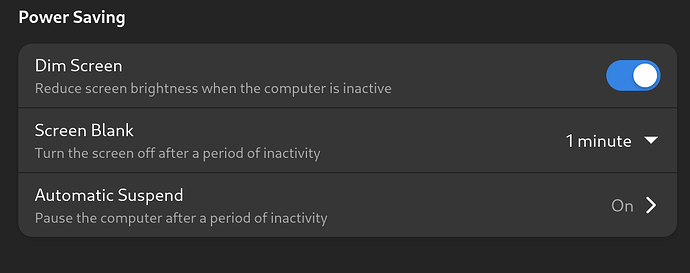Hello,
I recently installed NixOS with Gnome on my Ideapad Pro 5 14AHP9.
My configuration looks like the following:
# Edit this configuration file to define what should be installed on
# your system. Help is available in the configuration.nix(5) man page
# and in the NixOS manual (accessible by running ‘nixos-help’).
{ config, pkgs, ... }:
{
imports =
[ # Include the results of the hardware scan.
./hardware-configuration.nix
];
# Bootloader.
boot.loader.systemd-boot.enable = true;
boot.loader.efi.canTouchEfiVariables = true;
networking.hostName = "nixos"; # Define your hostname.
# networking.wireless.enable = true; # Enables wireless support via wpa_supplicant.
# Configure network proxy if necessary
# networking.proxy.default = "http://user:password@proxy:port/";
# networking.proxy.noProxy = "127.0.0.1,localhost,internal.domain";
# Enable networking
networking.networkmanager.enable = true;
# Set your time zone.
time.timeZone = "Europe/Berlin";
# Select internationalisation properties.
i18n.defaultLocale = "en_GB.UTF-8";
i18n.extraLocaleSettings = {
LC_ADDRESS = "en_GB.UTF-8";
LC_IDENTIFICATION = "en_GB.UTF-8";
LC_MEASUREMENT = "en_GB.UTF-8";
LC_MONETARY = "en_GB.UTF-8";
LC_NAME = "en_GB.UTF-8";
LC_NUMERIC = "en_GB.UTF-8";
LC_PAPER = "en_GB.UTF-8";
LC_TELEPHONE = "en_GB.UTF-8";
LC_TIME = "en_GB.UTF-8";
};
# Enable the X11 windowing system.
services.xserver.enable = true;
# Enable the GNOME Desktop Environment.
services.xserver.displayManager.gdm.enable = true;
services.xserver.desktopManager.gnome.enable = true;
# Configure keymap in X11
services.xserver.xkb = {
layout = "us";
variant = "intl";
};
# Configure console keymap
console.keyMap = "us-acentos";
# Enable CUPS to print documents.
services.printing.enable = true;
# Enable sound with pipewire.
hardware.pulseaudio.enable = false;
security.rtkit.enable = true;
services.pipewire = {
enable = true;
alsa.enable = true;
alsa.support32Bit = true;
pulse.enable = true;
# If you want to use JACK applications, uncomment this
#jack.enable = true;
# use the example session manager (no others are packaged yet so this is enabled by default,
# no need to redefine it in your config for now)
#media-session.enable = true;
};
# Enable touchpad support (enabled default in most desktopManager).
# services.xserver.libinput.enable = true;
# Define a user account. Don't forget to set a password with ‘passwd’.
users.users.andi = {
isNormalUser = true;
description = "Andreas Weinzierl";
extraGroups = [ "networkmanager" "wheel" ];
packages = with pkgs; [
vscode
element-desktop
bitwarden
pinta
typst
];
};
# Tray Icons
# https://nixos.wiki/wiki/GNOME#Managing_extensions
services.udev.packages = with pkgs; [ gnome.gnome-settings-daemon ];
# Debug Infos for Gnome Bugreports
services.nixseparatedebuginfod.enable = true;
######################################################
# Laptop energy settings #############################
######################################################
# Disable Gnome Energy utils
services.power-profiles-daemon.enable = false;
services.tlp = {
enable = true;
settings = {
CPU_SCALING_GOVERNOR_ON_BAT = "powersave";
CPU_SCALING_GOVERNOR_ON_AC = "performance";
CPU_ENERGY_PERF_POLICY_ON_BAT = "power";
CPU_ENERGY_PERF_POLICY_ON_AC = "performance";
CPU_MIN_PERF_ON_BAT = 0;
CPU_MAX_PERF_ON_BAT = 20;
CPU_MIN_PERF_ON_AC = 0;
CPU_MAX_PERF_ON_AC = 100;
#Optional helps save long term battery health
START_CHARGE_THRESH_BAT0 = 60;
STOP_CHARGE_THRESH_BAT0 = 80;
};
};
######################################################
# Remove default applications
environment.gnome.excludePackages = [
#pkgs.gnome.cheese
#pkgs.gnome-photos
#pkgs.gnome.gnome-music
#pkgs.gnome.gnome-terminal \
#pkgs.gnome.gedit
pkgs.epiphany
#pkgs.evince
#pkgs.gnome.gnome-characters
#pkgs.gnome.totem
#pkgs.gnome.tali
#pkgs.gnome.iagno
#pkgs.gnome.hitori
#pkgs.gnome.atomix
pkgs.gnome-tour
];
# Install firefox.
programs.firefox.enable = true;
# Allow unfree packages
nixpkgs.config.allowUnfree = true;
# List packages installed in system profile. To search, run:
# $ nix search wget
environment.systemPackages = with pkgs; [
# vim # Do not forget to add an editor to edit configuration.nix! The Nano editor is also installed by default.
# wget
gnomeExtensions.appindicator # Tray Icons: https://nixos.wiki/wiki/GNOME#Managing_extensions
];
# Some programs need SUID wrappers, can be configured further or are
# started in user sessions.
# programs.mtr.enable = true;
# programs.gnupg.agent = {
# enable = true;
# enableSSHSupport = true;
# };
# List services that you want to enable:
# Enable the OpenSSH daemon.
# services.openssh.enable = true;
# Open ports in the firewall.
# networking.firewall.allowedTCPPorts = [ ... ];
# networking.firewall.allowedUDPPorts = [ ... ];
# Or disable the firewall altogether.
# networking.firewall.enable = false;
# This value determines the NixOS release from which the default
# settings for stateful data, like file locations and database versions
# on your system were taken. It‘s perfectly fine and recommended to leave
# this value at the release version of the first install of this system.
# Before changing this value read the documentation for this option
# (e.g. man configuration.nix or on https://nixos.org/nixos/options.html).
system.stateVersion = "24.05"; # Did you read the comment?
}
However, it turns out that the following power settings don’t work:
According to some searching the screen should dim after 30s, but even after minutes neither the screen dims nor does it turn off.
I have tried different apps in the foreground, but the result is always the same.
How can I go about fixing this problem?
